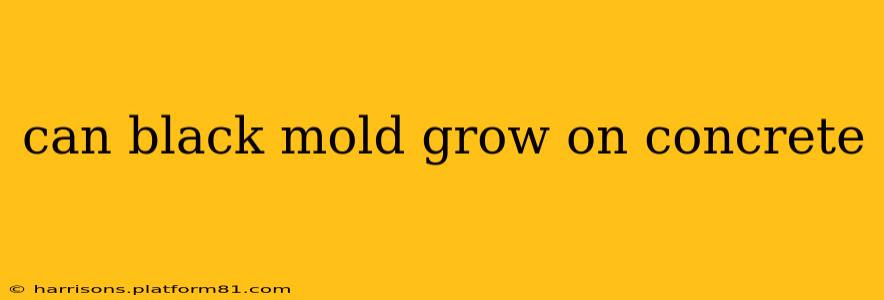Black mold, or Stachybotrys chartarum, is a type of fungus that thrives in damp, dark, and humid environments. While often associated with drywall and wood, many wonder: can black mold grow on concrete? The short answer is yes, but it's not as straightforward as it might seem. Concrete's porous nature and susceptibility to moisture create conditions that can support mold growth, although it's less common than on other building materials. Let's delve deeper into the complexities of black mold and concrete.
What Conditions Favor Black Mold Growth on Concrete?
Several factors determine whether black mold will grow on concrete. The key element is moisture. Concrete, even though durable, is porous. Prolonged exposure to water or high humidity can saturate the concrete, providing the necessary moisture for mold spores to germinate and proliferate. This is especially true in areas with poor drainage or inadequate ventilation.
How Does Moisture Get into Concrete?
- Leaks: Leaky pipes, roofs, or foundations are the most common culprits. Water ingress provides a constant source of moisture ideal for mold growth.
- Flooding: Floods can saturate concrete surfaces, creating a breeding ground for mold if not properly addressed with immediate drying and remediation.
- High Humidity: Even without direct water contact, consistently high humidity levels in a space can provide enough moisture for mold to colonize concrete, particularly in basements or crawl spaces.
- Condensation: Cold concrete surfaces in humid environments can experience condensation, providing a constant supply of moisture.
What Kind of Mold Grows on Concrete?
While Stachybotrys chartarum (black mold) can grow on concrete, it's more likely to find other types of mold species flourishing in such conditions. Black mold prefers materials with higher cellulose content, such as drywall or wood. Concrete, being largely inorganic, isn't its preferred substrate. However, other mold species adapted to less organic materials can still thrive in moist concrete environments.
Is Black Mold on Concrete Dangerous?
The dangers of black mold aren't solely tied to its location. The health risks associated with black mold exposure stem from inhaling its mycotoxins – toxic substances produced by the mold. Whether it's growing on concrete, wood, or drywall, inhaling mycotoxins can trigger various health problems, ranging from allergic reactions to more severe respiratory issues in susceptible individuals. Therefore, the presence of any mold, including black mold, on concrete requires prompt attention and remediation.
How to Prevent Black Mold Growth on Concrete?
Prevention is always better than cure. These measures can significantly reduce the risk of mold growth on concrete surfaces:
- Maintain Low Humidity: Use dehumidifiers in damp areas to keep humidity levels low.
- Improve Ventilation: Ensure adequate ventilation to prevent moisture buildup.
- Address Leaks Promptly: Repair any leaks immediately to prevent prolonged moisture exposure.
- Proper Drainage: Ensure proper drainage around the foundation to prevent water from accumulating against the concrete.
- Regular Cleaning: Regularly clean concrete surfaces to remove dirt and debris that can harbor mold spores.
- Sealing Concrete: Applying a sealant to concrete surfaces can reduce its porosity and make it less susceptible to moisture absorption. However, this doesn't completely eliminate the risk, and proper ventilation is still crucial.
How to Remove Black Mold from Concrete?
If you discover black mold on concrete, do not attempt DIY removal without proper safety precautions. Mold remediation requires specialized knowledge and equipment to prevent further spread and protect your health. Contact a professional mold remediation company to assess the situation and perform a safe and effective removal.
Can you kill black mold on concrete with bleach?
While bleach can kill some mold, it’s not a recommended solution for black mold on concrete. Bleach only kills mold on the surface, it does not penetrate the concrete to remove the root of the problem. It also can cause damage to the concrete if used incorrectly. Professional remediation is best.
What are the signs of black mold on concrete?
Signs of black mold can include discolored patches (not just black, but also dark green, brown, or gray), a musty odor, and sometimes a slimy or wet texture to the affected areas.
This comprehensive guide provides a thorough understanding of black mold and its potential to grow on concrete. Remember, prevention is key, and professional remediation is necessary if mold is already present. Always prioritize your health and safety.
